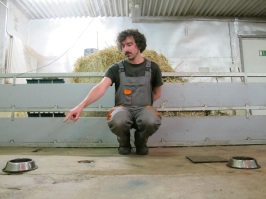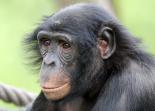If you are interested in working with us on goat behaviour/cognition at FBN Dummerstorf, please contact me via email or find more information regarding potential fellowship funding options here, here and here.
 We are hosting a biweekly webinar (‚Applying Ethology‘) on the Animal Welfare Slack workspace (Monday, 8 pm CET).
We are hosting a biweekly webinar (‚Applying Ethology‘) on the Animal Welfare Slack workspace (Monday, 8 pm CET).
Interest in presenting a talk yourself? Apply here!
About me

„Farm animals are sentient beings and have sophisticated cognitive capacities to deal with their physical and social environment. We shouldn’t treat them with less care than we want to have treated our pet animals.„
Hi, my name is Christian Nawroth. I stare at goats to better understand how they perceive their physical and social environment. My main research interests focus on animal cognition (in particular farm animals), applied ethology, and animal ethics. I am engaged in activities to increase the accessibility and dissemination of our research to our peers (e.g. Open Science workshops) and society in general (e.g. #SciComm presentations). In 2020, I took over the role of the Communications Officer of the International Society for Applied Ethology. From 2023 on, I serve as the spokesperson of the ‚Behavioural Biology‘ section of the German Zoological Society. I am one of the Chief Editors for Archives Animal Breeding and an Associate Editor for Animal Behavior & Cognition. I am also a member of the Editorial Boards of CABI Reviews and PCI Animal Science.
Please contact me if you have any questions regarding my research.
Find out more about my work on Open Science Framework, Google Scholar, ResearchGate, and Twitter.

Current Projects
My current research approaches stem from three pillars: novelty, infrastructure, and dissemination.
 Novelty: We are currently working to establish a looking time paradigm for goats. By relying on spontaneous reactions towards visual stimuli, rather than learned responses, we will be able to repeatedly test the same individuals in different test approaches. One of the main aims is going to assess the feasibility of an attention bias test for small ruminants. If you are interested in joining this project, drop me an email.
Novelty: We are currently working to establish a looking time paradigm for goats. By relying on spontaneous reactions towards visual stimuli, rather than learned responses, we will be able to repeatedly test the same individuals in different test approaches. One of the main aims is going to assess the feasibility of an attention bias test for small ruminants. If you are interested in joining this project, drop me an email.
Infrastructure: We are also involved in a multi-site research initiative, ManyGoats – a multi-site approach to promote open and reproducible research on goat behaviour and welfare.
Dissemination: Open Science (OS) practices, such as preprinting and Open Access publishing, help to improve the dissemination of our research output. To provide resources and arguments for a better implementation of OS practices, colleagues and I have published work on key steps for adopting OS practices and how these are interlinked with animal welfare concerns. I am also providing workshops on OS and the use of Social Media in animal science.
Recent and Past PhD students
N.N. (2023 – )
Jana Deutsch (2023 – )
Katrina Rosenberger (2017 – 2021)
Previous Projects

In 2017, we received 3 years of funding for a bilateral project (DFG and SNF) to run our studies on goat behaviour and cognition at two sites, one in Germany and one in Switzerland. The project was supervised by Dr. Jan Langbein at the Research Institute for Farm Animal Biology (FBN, Germany) and Dr. Nina Keil at the Agroscope Tänikon (Switzerland). In particular, we were interested in how domestication and specific selection aims have affected learning and cognition of different breeds of goats. Our PhD student Katrina Rosenberger also assessed the long-term effects of repeated cognitive testing on behavioural, motivational and physiological parameters in domestic animals, paving the way to a better incorporation of cognitive enrichment into concepts of animal welfare.
In 2015, I received a 2-year fellowship from the DFG  (German Research Foundation) in which I studied human-animal interactions in goats at Queen Mary University of London. The main goals of this project have been to investigate the kind of information goats extract from humans and how they use it in their decision-making processes. Our results indicate that goats, similar to dogs, show human-directed behaviour when confronted with a task they cannot solve on their own, differentiate between human attentional states, can discriminate between human emotional facial expressions and learn socially from humans in a spatial problem-solving task.
(German Research Foundation) in which I studied human-animal interactions in goats at Queen Mary University of London. The main goals of this project have been to investigate the kind of information goats extract from humans and how they use it in their decision-making processes. Our results indicate that goats, similar to dogs, show human-directed behaviour when confronted with a task they cannot solve on their own, differentiate between human attentional states, can discriminate between human emotional facial expressions and learn socially from humans in a spatial problem-solving task.
We also found that the personality traits of goats affect their performance in various learning and cognitive tasks. All tests were conducted at Buttercups Sanctuary for Goats in Kent/UK.
 During my PhD studies (supervised by Eberhard von Borell), I investigated a variety of physico- and sociocognitive capacities of farm animals. In particular, I studied whether test paradigms previously used with primates and dogs are suitable to test livestock animals. Here, my main research focused on the cognitive capacities of domestic pigs. We found that very young pigs are able to use indirect information to find food and, like dogs, are able to use complex human pointing gestures and a human´s head direction to a location that contains a reward.
During my PhD studies (supervised by Eberhard von Borell), I investigated a variety of physico- and sociocognitive capacities of farm animals. In particular, I studied whether test paradigms previously used with primates and dogs are suitable to test livestock animals. Here, my main research focused on the cognitive capacities of domestic pigs. We found that very young pigs are able to use indirect information to find food and, like dogs, are able to use complex human pointing gestures and a human´s head direction to a location that contains a reward.
In addition, I conducted cognitive studies on dwarf goats at the FBN in Dummerstorf, Germany. What first started as a side project quickly turned into a productive collaboration. Goats showed to be sensitive to the attentional state of a human, but, unlike pigs, were not able to use the head direction of a human to find a hidden reward. Surprisingly, goats showed exceptional skills in anticipating changes in their physical environment. Here, some individuals were able to follow complex movements of hidden objects – a task in which other non-primate mammals (e.g., dogs) normally perform poorly.
During my diploma thesis, I investigated decision-making under uncertainty in all four Great Ape species at the Max-Planck Institute for Evolutionary Anthropology (supervised by Josep Call).


Why were you ’surprised‘ by the abilities of the dwarf goats? Sounds as if you had preconceived ideas about them
LikeLike
‚Surprised‘ in a wider sense. ‚Being as stupid as a goat‘ is a common insult in Germany, so the results contradicted this commonly held misconception.
LikeLike
Sind Ihnen die Arbeiten von Prof. W. Bianca (Klimakammerversuche Chamau) bekannt. Auch haben wir ueber die Zwitterbildung bei Ziegen (Genetik) viel gearbeitet.
LikeLike
Das hoert sich sehr interessant an – gibt es einen Link zu den Arbeiten?
LikeLike
I grew up with African Pygmy goats as pets. I have always loved them more than dogs. They have so much personality, affection, curiosity and loyalty. True companions for an introverted child who spent almost every hour with our tiny herd outside school. I never knew their intelligence was in any doubt. Smarter than most dogs, including our Australian herding breeds. Best memories of childhood was spent wandering down goat trails in the woods and lowering fresh tender leaves on branches for them to enjoy.. Sometimes I wish my human kids were as winsome!
LikeLike